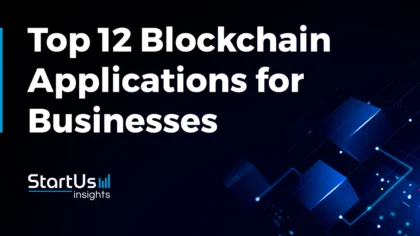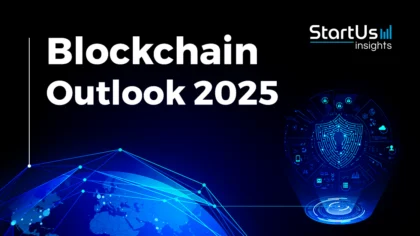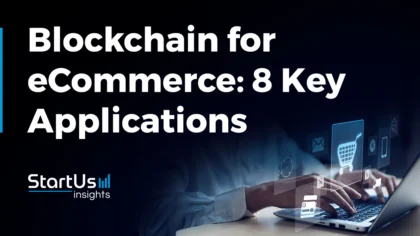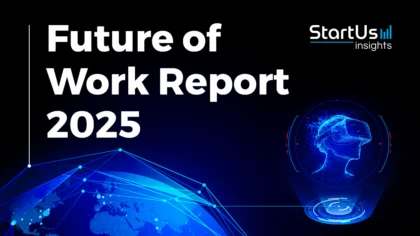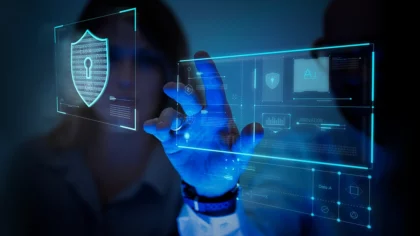What is the importance of blockchain in business? It evolved when the world’s uncertainties led to the requirement for a secure and trusted control system. The application and integration of blockchain megatrends in every sector have been well-accepted because of their decentralized, immutable, and transparent nature. Although it was originally introduced as the backbone of cryptocurrencies, blockchain has evolved far beyond its initial application and become a foundational technology in sectors ranging from finance and supply chain management to healthcare and governance. As industries and governments face growing demands for greater security, efficiency, and accountability, blockchain is emerging as a key enabler of these changes. It is redefining how information, assets, and value are exchanged on a global scale.
Why you should read this report?
- Gain insights into the top blockchain innovations impacting businesses
- Discover 30+ blockchain application areas
- Learn about 10+ innovative startups offering breakthrough solutions

Key Takeaways
- Tackling Climate Change
- Use Cases:
- Climate Finance
- Carbon Emission Monitoring
- Waste Management
- Startup to Watch: Ecoterra
- Use Cases:
- Demographic Shift
- Use Cases:
- Cross-border Financial Service
- Assets Tokenization
- Employment Opportunity
- Startup to Watch: Huros
- Use Cases:
- Rapid Urbanization
- Use Cases:
- Urban Planning
- Urban Governance
- Affordable Housing Solutions
- Startup to Watch: Intn.city
- Use Cases:
- The Energy Transition
- Use Cases:
- Decentralized Energy Systems
- Peer-to-Peer Energy Trading
- Energy Distribution Optimization
- Startup to Watch: Minechain
- Use Cases:
- Future of Mobility
- Use Cases:
- V2X Communications
- Decentralized Ride-Sharing Platforms
- Carbon Footprint
- Startup to Watch: blox.move
- Use Cases:
- Hyper-Connected World
- Use Cases:
- Data Security in Smart Cities
- Cybersecurity
- Interoperability
- Startup to Watch: Chirp
- Use Cases:
- Rise of Technology and Industry 5.0
- Use Cases:
- Human-Centric collaboration
- Counterfeit Prevention
- Mass Customization
- Startup to Watch: Infilock
- Use Cases:
- Shifting Economic Trends
- Use Cases:
- Cross-Border Transactions
- Property Ownership
- Freelance Economy
- Startup to Watch: Zorpeo
- Use Cases:
- Innovation to Zero
- Use Cases:
- Circular Economy
- Carbon Credit Trading
- Recycled Materials Certification
- Startup to Watch: r3chain
- Use Cases:
- Health and Wellness Evolution
- Use Cases:
- Clinical Trials and Research
- Smart Contract
- Vaccination Tracking
- Startup to Watch: XPR healthcare
- Use Cases:
- Uncertain Geopolitical Future
- Use Cases:
- Critical Infrastructure
- Tamper-Proof Voting System
- Trade Restrictions and Sanctions
- Startup to Watch: Adam Aerospace
- Use Cases:
- Fractured World
- Use Cases:
- Global Economic Stability
- International Collaborations
- Humanitarian Activities in Conflict Zones
- Startup to Watch: Safioo Society
- Use Cases:
Where is this Data from?
StartUs Insights provides data through its comprehensive Discovery Platform, which covers 4.7 million startups, scaleups, and tech companies globally, as well as 20,000 emerging technology trends. The platform excels in startup and technology scouting, trend intelligence, and patent searches, offering a detailed view of the innovation landscape. For this report, we analyzed technologies within specific industries using the trend intelligence feature. During this research, we identified patterns and trends, pinpointing relevant use cases and the startups developing solutions for each. More capabilities and details are available at StartUs Insights Discovery Platform.
12 Ways Blockchain is Advancing Business [2025 & Beyond]
1. Tackling Climate Change
Blockchain-based tokens are integrated with climate targets and commitments. These tokens align economic incentives with environmental goals and allow countries, companies, or individuals to trade or transfer these tokens as part of broader climate initiatives. Blockchain also facilitates international cooperation on climate agreements. For example, the Paris Accord ensures transparency in emissions reporting and compliance with climate targets. Additionally, blockchain automates reporting, tracks commitments, and increases trust between countries through an immutable and transparent system.
3 Practical Use Cases of Blockchain in Tackling Climate Change
- Climate Finance: Blockchain facilitates decentralized climate finance platforms, where investors can fund green projects directly. These platforms reduce intermediaries and make supporting sustainable energy projects, reforestation efforts, and other climate change initiatives easier.
- Carbon Emission Monitoring: Sensors and IoT devices used for carbon emission monitoring feed data into blockchain networks. It ensures accurate, real-time emissions monitoring for industries and cities. Additionally, smart contracts align compliance with emissions reduction goals by tracking progress and enforcing penalties if targets are missed.
- Waste Management: Blockchain combats illegal dumping and improves recycling rates by introducing tokens. These tokens incentivize recycling efforts. It rewards individuals or businesses for proper waste disposal and recycling.
Startup to Watch: Ecoterra
Romanian startup Ecoterra develops a blockchain-based carbon offset marketplace for businesses and individuals to engage in eco-friendly actions while earning rewards. The Recycle2Earn platform lets customer scan their recyclable product and accumulate ecoterra tokens for every recyclable item. It requires scanning the product, recycling it in the dedicated RVM machines, getting a receipt after the recycling, and uploading it in the app. The company’s marketplace facilitates the purchase of recycled materials such as plastic, glass, and aluminum using ecoterra or other cryptocurrencies. The accumulated tokens are also used to fund educational programs about sustainability, verified cleaning projects, green technology adoption, and tree-planting campaigns.
2. Demographic Shift
Demographic shifts such as aging populations, migration, and urbanization lead to global changes in population structure. Blockchain creates efficient, transparent, and decentralized systems in healthcare, financial services, governance, and social welfare to provide secure digital identities for shifting people. These digital identities can be accessed from anywhere. It becomes easier for people, particularly migrants and displaced populations to access essential services such as healthcare, banking, and education with these digital identities.
3 Practical Use Cases of Blockchain in Demographic Shift
- Cross-border Financial Service: Migrating people send remittances back to their home countries. Blockchain-powered financial platforms offer low-cost, secure, fast cross-border payments, which reduce delays for such transactions. In developing regions, often affected by demographic shifts, people use decentralized finance (DeFi) to access loans, savings accounts, and insurance without a traditional banking infrastructure.
- Asset Tokenizations: As populations age or migrate, there may be an increasing demand for alternative retirement investments or intergenerational wealth transfers. Blockchain allows assets to be tokenized and divided into smaller, accessible units. This approach opens up investment opportunities for younger or emerging demographics who might not have the capital to invest in large assets.
- Employment Opportunity: Blockchain powers decentralized job platforms, where migrants or those in regions affected by demographic changes, securely find work without intermediaries. Verified skills and credentials on the blockchain allow transparent and trustworthy hiring. Blockchain also allows for the secure verification of credentials and facilitates smoother integration into the labor market.
Startup to Watch: Huros
Singaporean startup Huros offers SPLICE, a robust tokenization platform that enables businesses to digitize and fractionalize ownership of real-world assets. The technology transforms physical assets into digital tokens, which allows easy transfer and ownership in a secure marketplace. SIGMA, Huros’ luxury marketplace, provides a platform for trading fractional ownership of premium alternative assets, supported by Huros’ network of elite asset partners.
3. Rapid Urbanization
Blockchain supports decentralized management of smart city services like energy distribution, waste management, and transportation. Cities track and optimize resource use by creating a transparent and immutable ledger. It ensures more efficient urban service delivery in rapidly growing cities. Additionally, blockchain-based platforms automate city services through smart contracts and enable faster and more transparent management of services such as permitting utilities, and public safety. This approach reduces bureaucracy and improves service delivery for growing urban populations.
3 Practical Use Cases of Blockchain in Rapid Urbanization
- Urban Planning: Blockchain assists urban power management with decentralized and transparent energy management in smart grids. By integrating blockchain into energy grids, cities ensure optimal use of renewable energy sources, reduce energy waste and allow peer-to-peer energy trading, which is crucial in densely populated urban areas.
- Urban Governance: Blockchain supports transparent and secure voting in urban areas for residents to participate in local elections, referendums, and public consultations. This strengthens democratic participation and ensures that urban planning reflects the demands of rapidly growing populations. Cities also use blockchain to track budget allocations and expenditures on a public ledger, which assists cities in maintaining accountability in how funds are used for urban development projects.
- Affordable Housing Solutions: Blockchain tokenizes real estate, which enables fractional ownership and crowdfunding for housing projects. It addresses the housing shortages commonly seen in rapidly urbanizing areas. Blockchain also supports transparent rental platforms where smart contracts govern lease agreements, rent payments, and tenant rights.
Startup to Watch: Intn.city
US-based startup Intn.city offers a blockchain-based platform for Autonomous Community Ecosystems (ACEs), which allows communities to collaboratively finance and build local infrastructure through Distributed Autonomous Organizations (DAOs). The platform operates through an app-based ecosystem that assigns rights, responsibilities, and tasks to improve neighborhood services such as street cleaning, transport, and energy distribution. Intn.city incentivizes community investment through reward frameworks and financing mechanisms.
4. The Energy Transition
The energy transition involves shifting from fossil fuels to cleaner, renewable energy sources like solar, wind, and hydropower. Blockchain ensures that Renewable Energy Certificates (RECs) or Guarantees of Origin (GoOs) are authentic and not double-counted. It also provides transparency in the entire lifecycle of energy production and consumption. For example, blockchain tracks every step from the sourcing of materials for solar panels and wind turbines to the actual energy generation process. This transparency ensures that renewable energy projects adhere to environmental standards and ethical sourcing practices.
3 Practical Use Cases of Blockchain in the Energy Transition
- Decentralized Energy Systems: Blockchain enables decentralized autonomous organizations (DAOs) that manage energy networks without centralized control. DAOs use smart contracts to autonomously manage energy distribution, storage, and trading. This method is useful in rural or remote areas, where communities manage local renewable energy grids, which are independent of the main grid.
- Peer-to-peer Energy Trading: Through blockchain-based platforms, homeowners and businesses that produce excess renewable energy (e.g., from solar panels) sell it directly to others in their local area using decentralized platforms. This approach eliminates the need for intermediaries and democratizes energy markets. Smart contracts ensure automated and transparent transactions in these cases.
- Energy Distribution Optimization: Smart grids dynamically adjust energy flow based on real-time demand. It improves grid stability, balances supply and demand in real time, and reduces energy waste. Additionally, blockchain also manages the variability of renewable energy sources by distributing excess energy during peak production and storing it in times of low demand.
Startup to Watch: Minechain
German startup Minechain delivers a traceable authentication platform for green hydrogen management by combining real-time IoT data with blockchain security. The platform integrates strategically placed sensors that monitor every stage of hydrogen’s lifecycle with a decentralized technology. The decentralized technology ensures the authenticity of green hydrogen. The platform provides the stakeholders with an immutable record of its environmental credentials.
5. Future of Mobility
Blockchain integration in mobility increases trust, efficiency, and innovation across various aspects of the transportation industry, including autonomous vehicles, electric vehicles (EVs), shared mobility, logistics, and more. The technology enables secure, transparent, and tamper-proof communication between autonomous vehicles as they share critical data such as traffic information, navigation updates, and vehicle condition reports. It also prevents hacking or data manipulation by providing a decentralized, zero-trust system for sharing this data securely.
3 Practical Use Cases of Blockchain in the Future of Mobility
- V2X Communications: Blockchain supports Vehicle-to-Everything (V2X) communication, which is vital for smart transportation. Vehicles communicate with traffic lights, road infrastructure, and other vehicles through decentralized networks. Blockchain ensures the integrity and security of these data exchanges in real-time.
- Decentralized Ride-sharing Platforms: Blockchain eliminates intermediaries (like traditional ride-hailing companies) by enabling decentralized, peer-to-peer ride-sharing platforms. Using blockchain, users can book rides directly from drivers, with smart contracts ensuring secure, transparent payments and automatic execution of privacy terms.
- Carbon Footprint: Blockchain tracks a vehicle’s carbon emissions and fuel consumption throughout its lifecycle. This is especially useful for ensuring compliance with environmental regulations. Blockchain tokenizes carbon credits for vehicles, companies, or individuals, which can be traded in decentralized markets. Drivers and companies also earn tokens or rewards for reducing their carbon footprint.
Startup to Watch: blox.move
Irish startup Blox.move develops a decentralized ledger protocol for mobility providers. The technology was built under the supervision of Mercedes Benz for more than 3 years. It is based on open source, interchain communication, tech inclusion, and green technology. The platform allows providers to offer services on a shared operating system built on Ethereum (Polygon) and Corda. The platform automates and secures cross-company transactions through tokenization. Although the technology operates in the backend and remains invisible to end-users, it ensures trust in B2B interactions. The modular architecture of the platform allows single-component integration instead of the entire platform.
6. Hyper-Connected World
Blockchain’s decentralized nature allows for the secure and automated management of IoT devices. It ensures that IoT devices communicate and share data securely without relying on a central authority. This approach reduces the risk of hacking and data breaches. For instance, a blockchain-based system can automatically update firmware or manage permissions for devices, which ensures they are operating securely without human intervention.
3 Practical Use Cases of Blockchain in Hyper-Connected World
- Data Security in Smart Cities: With blockchain, individuals can maintain ownership of their data while allowing access to specific entities. It improves privacy and data security in connected environments, a rising occurrence in the current scenario.
- Cybersecurity: Blockchain decentralizes security protocols and reduces reliance on centralized servers that are often prime targets for hackers. Blockchain’s immutable nature allows organizations to maintain tamper-proof records of transactions and events, which is critical in industries like finance, healthcare, and manufacturing.
- Interoperability: Through the use of standardized protocols, smart contracts, and cross-chain technology, blockchain enables the interaction between various platforms without relying on intermediaries. This interoperability allows for more efficient global transactions and secure sharing of information across industries. It also reduces friction in a hyperconnected digital economy.
Startup to Watch: Chirp
US-based startup Chirp is using decentralization to create a Depin network, powered by SaaS and community-hosted IoT. Chirp has created a multi-protocol gateway, called Blackbird that fuels Chirp’s IoT capacity. To connect IoT devices, the Blackbird utilizes LORaWAN, LoRa, 2.4 GHz, thread/matter protocol, and BLE. The connection is strong enough to penetrate concrete and track movement minutely. The Blackbird miners can earn $Chirp just for hosting the network. Additionally, Chirp also has a 5G community-owned miner called the Cardinal. It functions independently of the keeper’s internet and uncovers the true power of a 5G connection.
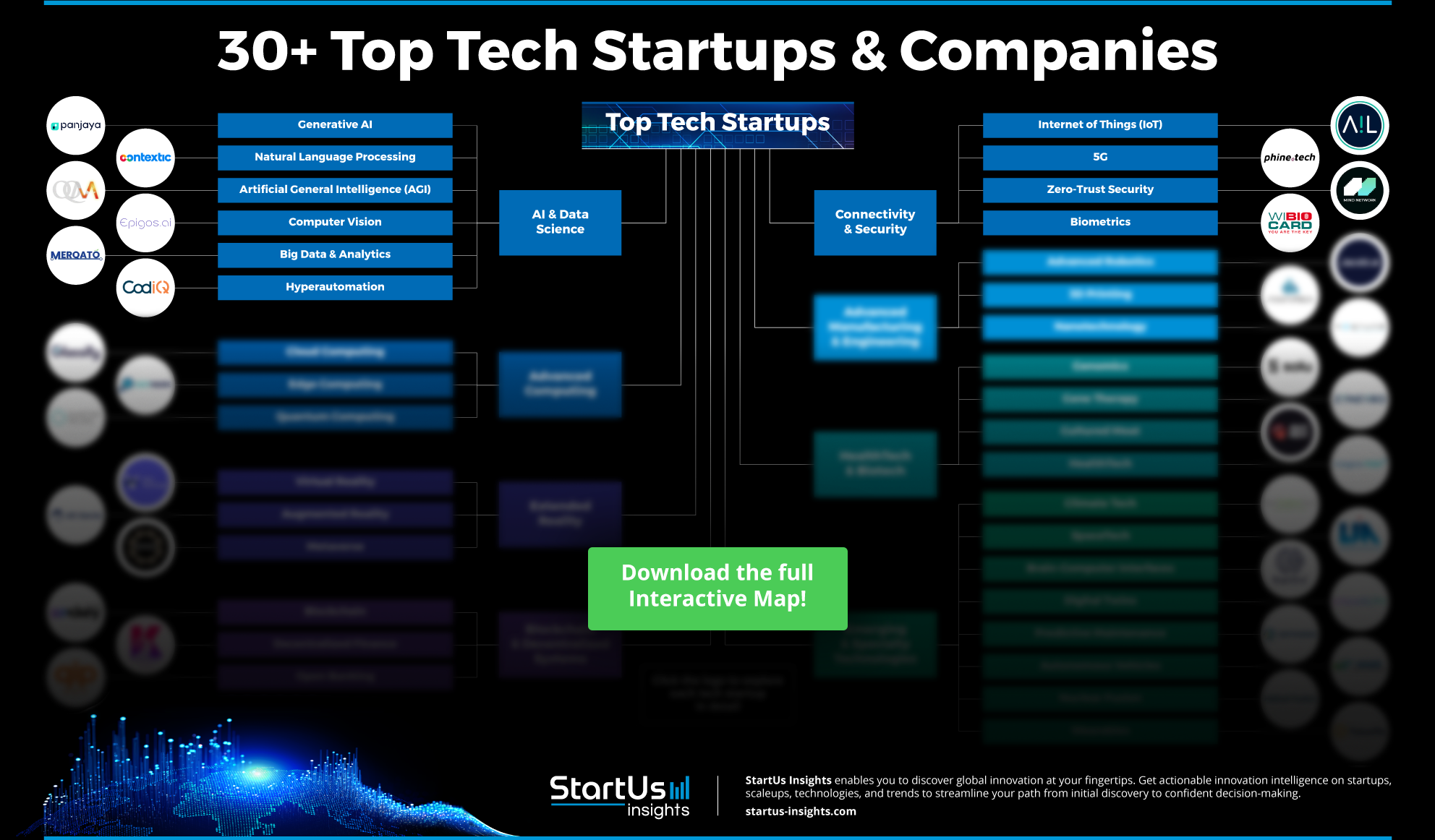
7. Rise of Technology and Industry 5.0
The current technological evolution focuses on human-centered, sustainable, and resilient industry practices by combining advanced technology with human creativity and decision-making. Industry 5.0 builds upon Industry 4.0, which emphasizes automation, AI, IoT, and smart manufacturing. Blockchain takes care of huge amounts of data generated daily because of this development. It ensures data integrity through decentralized, immutable ledgers, which protect against tampering or unauthorized access. This is critical in maintaining trust in industrial systems where data flows continuously between various stakeholders.
3 Practical Use Cases of Blockchain in the Rise of Technology & Industry 5.0
- Human-centric Collaboration: In Industry 5.0, blockchain supports new organizational models like DAOs (Decentralized Autonomous Organizations), where decision-making is decentralized and powered by blockchain-based voting and governance systems. Organizations embrace greater human collaboration, creativity, and innovation without relying on traditional hierarchical structures using these DAOs.
- Counterfeit Prevention: Blockchain’s immutable ledger technology prevents tampering with production data. It makes identifying counterfeit products easier in industries like pharmaceuticals, electronics, and automotive manufacturing. This technique builds trust between manufacturers, suppliers, and consumers.
- Mass Customization: Industry 5.0 emphasizes personalized production, where manufacturers produce customized products based on customer preferences. Blockchain facilitates the secure exchange of customer data and preferences. It also makes sure that intellectual property (IP) behind the customization is protected, which allows innovators to securely register and track their inventions, designs, and processes.
Startup to Watch: Infilock
Canadian startup Infilock designed a PaaS, InfiIoT for industrial IoT monitoring, powered by Infiwatch and InfiTelligence. InfiIoT is based on blockchain and smart contracts. It connects users to devices, secures devices against cyberattacks, encrypts data, and makes the platform highly available. InfiWatch monitors transactions and sends alerts in case of an anomaly. InfiTelligence is a codeless interface for integrating machine learning and rule engine flows. It allows easy data processing by predictive maintenance. One of the major applications of InfiTelligence is predicting the faulty status of the devices using historical data, which ensures timely maintenance.
8. Shifting Economic Trends
Traditional financial systems rely heavily on intermediaries like banks and payment processors. Blockchain enables peer-to-peer financial transactions and reduces the need for intermediaries. It decreases transaction costs and speeds up processes. DeFi provides financial services like lending, borrowing, and trading to individuals who are unbanked or underbanked, especially in emerging markets. This democratization of finance shifts economic power from traditional financial institutions to individuals and decentralized networks.
3 Practical Use Cases of Blockchain in Shifting Economic Trends
- Transaction Convenience: The rise of cryptocurrencies offers an alternate means of exchange in economies with unstable currencies or high inflation. Additionally, tokens introduction has improved the variety of commodities that can be traded. Today, tokens can be attached to everything from carbon to properties. It can be used for trading from any corner of the world irrespective of the currency situation.
- Property Ownership: Blockchain allows for the secure and transparent ownership of digital assets, such as non-fungible tokens (NFTs). This has created new markets for digital art, collectibles, and intellectual property and reshaped industries like entertainment, gaming, and fashion. Blockchain also provides a decentralized method for registering and proving intellectual property (IP) ownership, which reduces the risk of IP theft.
- Freelance Economy: Blockchain-based platforms allow freelancers and gig workers to be paid directly for their services without going through intermediaries like platforms that take a percentage of their earnings. Smart contracts ensure timely payments upon project completion. DAOs enable individuals to collaborate on projects without a centralized management structure. Altogether it offers more flexible, democratic work environments.
Startup to Watch: Zorpeo
UK-based startup Zorpeo builds a blockchain-based platform as a community marketplace. The marketplace blends the benefits of blockchain technology with digital finance to provide its users and businesses with a smooth way of managing payments. The platform utilizes the Polygon network and USDC for fast, cost-effective payments. By integrating smart escrow services, Zorpeo adds a layer of security, which builds trust between buyers and sellers.
9. Innovation to Zero
Through smart contracts, decentralized systems, and immutable records, blockchain is powering the next wave of innovation aimed at achieving a sustainable, equitable, and resilient world. Blockchain promotes zero carbon emissions, zero waste, zero inequality, and zero fraud while accelerating sustainability, efficiency, and financial inclusion. The immutable and transparent nature of blockchain is especially important in this scenario as innovation to zero requires a lot of intellectual properties that need to be protected from breach.
3 Practical Use Cases of Blockchain in Innovation to Zero
- Circular Economy: Blockchain tracks products throughout their lifecycle and verifies recycling or reusing processes. It ensures materials are diverted from landfills and repurposed efficiently. This approach supports zero-waste initiatives by making the entire product lifecycle transparent and accountable.
- Carbon Trading: Instead of releasing greenhouse gases into the atmosphere, it can be integrated with blockchain to create carbon offset tokens. These tokens are a way of incentivizing efforts towards carbon capture and reuse. Carbon offset tokens can be traded to purchase recycled material or fund an environmental drive.
- Recycled Material Certification: Blockchain verifies the authenticity of recycled or upcycled materials used in new products. The certification generated from studying the quality of the product is decentralized and transparent for everyone to check. This technique prevents any counterfeit in the product quality and ensures the efforts towards sustainability are well responded to.
Startup to Watch: r3chain
Portuguese startup R3chain provides end-to-end traceability for plastic credits through a plastic recycling platform powered by AI and blockchain technology. The platform uses AI computer vision to validate plastic collection through photos and videos, while blockchain records the weight, invoice details, and processing data. R3chain issues two types of credits: Plastic Removed Credits for collection and Plastic Recycled Credits for the weight of recycled materials. The platform also provides proof of retirement on the blockchain. This retirement process permanently removes plastic credits from circulation after they have been used to reverse plastic footprint. It prevents double counting of the credits and provides a concise and accurate method for credit retirement.
10. Health and Wellness Evolution
Blockchain allows patients to securely store and control access to their medical records. Instead of relying on centralized databases, patients can share their data with healthcare providers through a blockchain system. This prevents unauthorized access and minimizes the risk of data breaches. Blockchain creates a universal and decentralized system for sharing health records across providers and institutions. The record can be accessed in real-time and across borders securely. This interoperability improves patient care by allowing doctors to access comprehensive medical histories without delays or barriers.
3 Practical Use Cases of Blockchain in Health & Wellness Evolution
- Clinical Trials & Research: Blockchain ensures the integrity of clinical trial data by providing an immutable record of all data entries. This approach reduces the risk of data manipulation or errors in research and leads to more accurate and trustworthy results. Blockchain-based systems also tokenize participation in clinical trials, which attract more participants and accelerate research and development of new treatments.
- Smart Contract: Blockchain-enabled smart contracts automate and streamline insurance claim processes. When certain conditions are met, smart contracts trigger automatic payments from insurance companies to healthcare providers. It offers real-time tracking of medical billing and transactions, which reduces the risk of overcharging or fraud.
- Vaccination Tracking: Blockchain tracks the distribution of vaccines and ensures they are delivered to the right locations, and stored under proper conditions. This transparency reduces vaccine fraud and ensures equitable distribution, especially during global pandemics. Blockchain also provides proof of immunization in a way that is secure, easily accessible, and tamper-proof.
Startup to Watch: XRP Healthcare
UAE-based startup XRP Healthcare develops a blockchain and AI-powered platform for secure and automated transactions. By leveraging the XPR Ledger, the platform ensures transparency, efficiency, and security in healthcare transactions. XPR Healthcare partners with 68,000 pharmacies, where the users can pick up prescriptions using a unique ID number from the XRPH app. Each time the card is used, USD 1 worth of XRPH Tokens is credited to the user’s wallet. This payment is made automatically every 60 days. Additionally, the app also offers savings on prescriptions and medicines.
11. Uncertain Geopolitical Future
Blockchain navigates an uncertain geopolitical future by improving trust, transparency, and resilience in global transactions, supply chains, and digital infrastructure. It supports humanitarian efforts, strengthens cybersecurity, and offers decentralized alternatives to traditional financial and governance systems. Altogether, it helps individuals, businesses, and governments adapt to geopolitical instability.
3 Practical Use Cases of Blockchain in Uncertain Geopolitical Future
- Critical Infrastructure: In a geopolitical crisis, centralized systems like banking or energy grids may be targeted. Blockchain’s decentralized nature makes critical infrastructures less vulnerable to cyberattacks or government control. It also prevents disruption by distributing control across a network.
- Tamper-proof Voting System: Blockchain ensures electoral integrity in regions with low political stability or trust in electoral systems. It creates secure and transparent voting systems, resistant to tampering and fraud. By doing this, blockchain increases trust in democratic processes and reduces potential conflicts.
- Trade Restrictions & Sanctions: In regions affected by sanctions, blockchain offers an alternative means of conducting trade. Businesses use cryptocurrencies and smart contracts to bypass traditional banking systems that may be restricted. In times of geopolitical instability, national currencies experience extreme volatility or devaluation. Blockchain-based stablecoins or decentralized cryptocurrencies offer a more stable alternative in such cases.
Startup to Watch: Adam Aerospace
US-based startup Adam Aerospace developed Zenith 0, an advanced cryptography solution and private distributed ledger designed to authenticate, secure, and distribute critical data. The platform protects data by passing it through multiple secure checkpoints, applying a blockchain layer, and referencing it across a shared ecosystem of verification points. This process ensures that data is error-proof and continuously monitored across multiple locations. Zenith 0 boasts near-zero audit times and robust security. It is ideal for high-stakes applications like the U.S. Air Force, where it secures data transfers and analyses for manned and unmanned aircraft. The company’s solution, BASE, extends this infrastructure to streamline personnel records for active members and veterans. Adam Aerospace provides an easily integrable solution that makes blockchain readily available for everyone.
12. Fractured World
Blockchain technology offers a range of solutions for managing and mitigating the effects of a fractured world. By improving transparency, trust, and resilience across various sectors, blockchain addresses challenges related to governance, humanitarian aid, supply chain management, cybersecurity, and financial inclusion. Its decentralized and immutable properties provide a foundation for building a more stable, transparent, and resilient global system, even during geopolitical instability and fragmentation.
3 Practical Use Cases of Blockchain in a Fractured World
- Global Economic Stability: Blockchain facilitates decentralized trade networks that reduce reliance on traditional intermediaries and central authorities. By providing a transparent and tamper-proof ledger for transactions, blockchain ensures that trade agreements and financial exchanges are secure and trustworthy.
- International Collaborations: Blockchain facilitates secure and transparent collaboration on international research projects by providing an encrypted platform for sharing data and research findings. This method encourages cooperation between nations and organizations. This is important for addressing global challenges such as climate change, pandemics, and technological advancements.
- Humanitarian Activities in Conflict Zones: Blockchain improves the efficiency and transparency of humanitarian aid distribution by providing a secure and transparent ledger for tracking donations, aid supplies, and their delivery. This ensures that aid reaches the intended recipients and reduces the risk of misallocation or corruption. Blockchain also creates secure digital identities for displaced individuals, which allows them to access essential services such as healthcare, education, and financial support.
Startup to Watch: Safioo Society
Safioo Society is a Portuguese startup that develops a good governance platform to target, track, engage, and optimize donations, and investments from philanthropists and impact investors. The blockchain-based platform is easy to use, cost-effective, secure, and transparent. The platform has the option of recording the donations in cash or cryptocurrency. The donors can choose from a list of charities and non-profits, whereas the investors can choose from a list of stocks, bonds, and funds. The platform also encourages collaboration, generates quarterly reports, and incentivizes participation in leadership learning communities.
Act Now to Take Advantage of Top Blockchain Technologies
Take immediate action on the top emerging blockchain technologies to stay ahead in the industry. StartUs Insights empowers you to uncover hidden opportunities among 4.7 million startups and tech companies, alongside insights into 20,000 technologies and trends. Our AI-powered, real-time database provides unparalleled access to solutions that are not available elsewhere, ensuring you always lead in innovation.
Big companies like Samsung, Nestlé, and Magna rely on our tools to spearhead trends and optimize operations. Dive into unmatched data and benefit from a 360-degree industry view for actionable insights. Get in touch with us now to discover how our innovation intelligence can elevate your strategic initiatives.
Discover All Blockchain Technologies & Startups!
